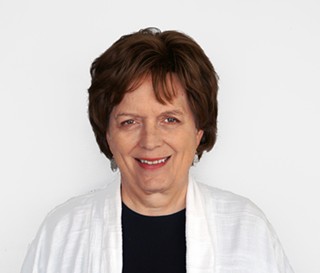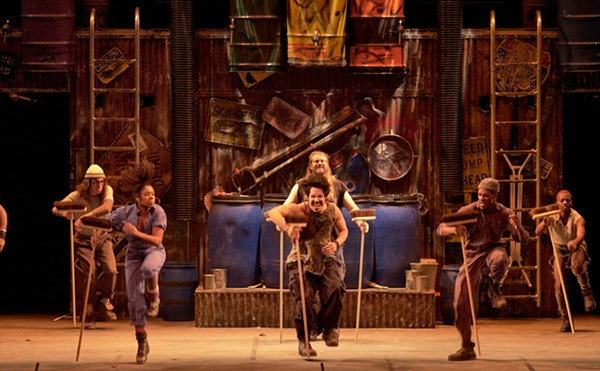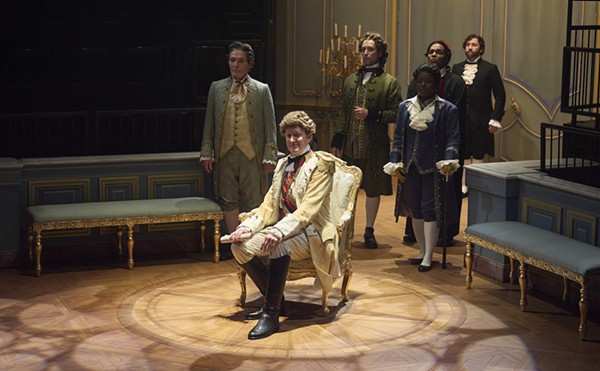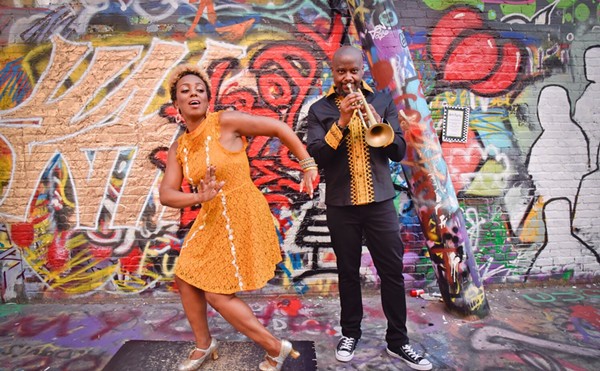It is often said that a movie or play is "ripped from the headlines," and that is sometimes a careless trope. But you can believe every fear that's released in I Call My Brothers now at Cleveland Public Theatre.
Written by Jonas Hassen Khemiri, the acclaimed Swedish novelist and playwright, the play is a fictionalized version of a real event, an actual bombing that took place in central Stockholm some years ago (not the one Trump hallucinated over the weekend). This piece, which began as a short novel, pulses with the continual paranoia of an innocent man who stands out in a crowd. And when that crowd turns ugly, as has happened in the recent past and will certainly happen again, suffering abounds.
In this telling, a car bomb has been exploded and reports have it that it was set by a bearded Middle Eastern man wearing a keffiyeh and carrying a large backpack. A young man named Amor fits that exact description and, although he had nothing to do with the bombing, he is suddenly viewed with suspicion — or worse — by those looking for the terrorist.
This script, as translated by Rachel Willson-Broyles, shifts back and forth from Amor's frightened journey through the city to his internal thoughts and memories and eventually some dream sequences. It is loaded with powerful stuff, but there is so much disconnection inherent in the staging that the play never lands the knockout blow it seems to desire.
From the start we are drawn to Amor in a scene with his brother Shavi, a good-natured guy who Amor nicknames "helium" for his lighter-than-air approach to life. But once the bomb goes off, everything changes. Suddenly, Amor knows he will be perceived as the possible terrorist. At this point, we are completely with him as he reviews his impossible behavior imperatives: "The goal is to blend in, to become invisible ... smile at everyone, apologize for existing."
This is the point where the novelistic source of the story does little to help the theatrical presentation. The playwright sends Amor off into fragmented scenes with his new-agey cousin Ahlem, his ex-girlfriend Valeria, and others. These might work very well on the printed page, but on stage there has to be a more cohesive thread to keep the audience lashed to the storyline. Instead, these isolated scenes begin to sap the strength of the central conflict and weaken its ultimate impact.
That said, the four-person cast performs with energy and specificity, with three of them playing multiple roles. Abdelghani Kitab is absolutely endearing as Shavi, providing Amor with a solid familial base that the tormented man draws upon. Andrea Belser delivers a crisp portrayal of Valeria, a woman who can't return Amor's ardor. And Rocky Encalada is particularly effective in roles that range from the spacey Ahlem to a sunglasses-wearing security officer to Amor's doting grandmother Tyra.
However, the play depends to a large degree on the person who plays Amor, and Salar Ardebili has many compelling moments. He is extremely accessible as an actor, and that helps us develop empathy for his character — an absolute must in a show like this. But Amor is a complicated person who carries a knife without realizing it could be seen as a weapon, and who carries out his family responsibilities with an undercurrent of resentment.
Ardebili only partially succeeds in fleshing out this multi-layered person. Some of that may be due to the translation, which leans towards establishing Amor as an everyman instead of this one very specific individual. Even though director Evren Odcikin paces the production extremely well, some of the scenes need a bit more separation to allow the audience to recalibrate. And by sometimes insisting on a rapid, hip-hop, poetry slam style of delivery, many words are lost in the high-speed verbal volleys.
On stage, speed is no substitute for intensity, and this is a play where intensity would have served better in several key instances. One positive example is when Amor imagines a conversation with grandma Tyra, a poignant moment that avoids coming off as cloying due to the quiet, emotionally honest nature of the interaction.
The set design by Douglas Puskas — frames with fragments and small objects floating around and about — is quite lovely under Wes Calkin's lighting. But it does little to help convey the story, which a play like this could use. There are so many discrete parts to the vehicle of I Call My Brothers that the engine of the play is unintentionally given short shrift. And that's unfortunate, given a world where millions of people may soon (and often) be in the same position as Amor.













